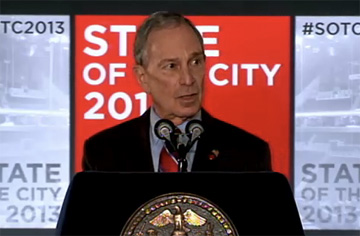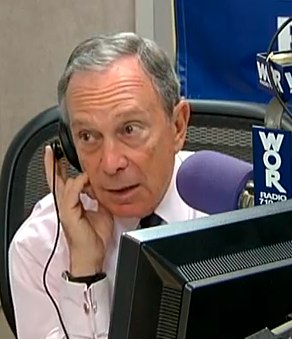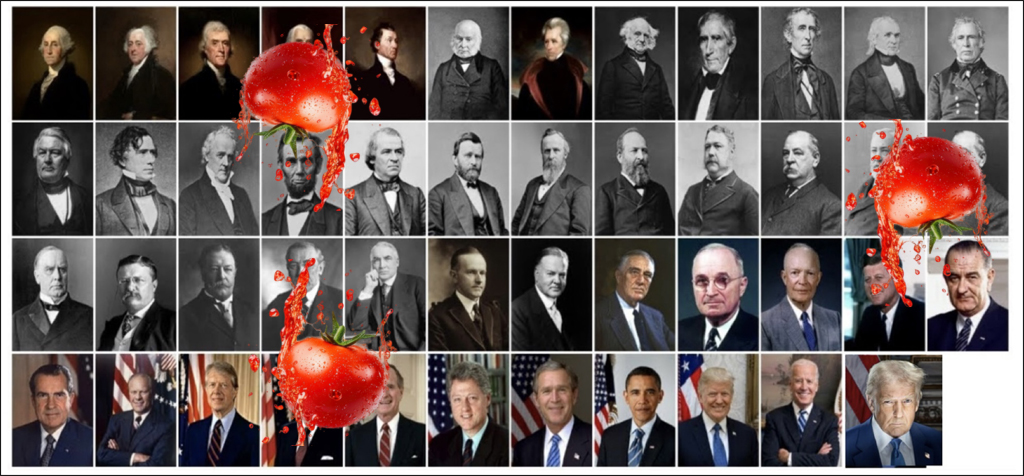Call him President Pothole.
Would-be Democratic presidential nominee Mike Bloomberg will unveil a fleshed out infrastructure plan that focuses mostly on maintaining what we already have, rather than building new roads and bridges, while also investing three times more federal dollars to boost the reach and ridership of local transit systems.
He'd also create what the campaign is calling a $1-billion "pothole" fund for immediate critical road repairs (though not likely to literally just fill potholes).
Details of the plan were provided to reporters on Tuesday, but will be released to the nation as part of a speech the former New York City mayor will give at the U.S. Conference of Mayors gathering in Washington, D.C. later on Wednesday.
“President Trump has wasted billions of taxpayer dollars on a border wall that should’ve gone to fixing our roads and bridges and airports and water lines and to building the new infrastructure we need,” Bloomberg is expected to say, according to a preview of his remarks. "We won’t beat China with trade wars that harm our own farmers and factory workers — we’ll do it by investing in America. ... As president, I will rebuild America and our crumbling infrastructure in partnership with local and state governments."

In their preview of the plan, campaign advisers highlighted the campaign pledge to dedicate one-quarter of federal highway money to maintenance — a huge increase in what is currently allocated (which is pretty easy because virtually no federal money is set aside for maintenance).
"It's insane that there is no federal maintenance requirement," said livable streets deity Janette Sadik-Khan, a Bloomberg adviser. "U.S. policy pays states to build a new bridge or a road, but we don't ask for any funding to maintain it."
That type of talk was hailed by transportation advocates.
"The Bloomberg proposal stands out from any infrastructure proposal we have seen by stating that money isn't the problem facing our nation's infrastructure," said Beth Osborne of Transportation For America, who was quick to point out that the Bloomberg plan relied heavily on the group's recent demand that no new roads get built until everything we have is properly repaired.
"T4A announced a similar position last summer, stating that more money alone will not suffice without accountability for measurable, tangible accomplishments," she added. "It is a relief to finally see a proposal that recognizes this and proposes a different direction with more accountability."
Here are some of the main agenda items from the Bloomberg plan:
- The campaign's set as a goal repairing all of America’s busiest roads and bridges by 2025 — an estimated 240,000 miles of roads and 16,000 bridges. As president, Bloomberg said he would require that 25 percent of all funding to states through the Surface Transportation Block Grant Program would be set aside for maintenance. "Mike will be using data to identify the most effective ways to spend the money — and detailing outcomes that need to be achieved from the projects," campaign spokeswoman Jean Weinberg told Streetsblog. "That will help to both ensure the money is going to the right places, and provide the accountability."
- A target of saving 20,000 lives by 2025 by adopting safe street designs, lowering speed limits, and implementing other safety measures. Bloomberg aides said the plan called for triple funding for bike and pedestrian projects, though no details were provided on what projects would be funded or how lives would be saved.
- The billionaire digital information mogul would build a "21st-century" clean energy grid for half the country.
- On transit, Bloomberg would build rail links to 10 of the country’s busiest airports by 2030; triple federal funding to transit to "expand and improve" it for 50 million Americans; and develop at least one high-speed rail line by 2025. Campaign aides said the money for that would be allocated to whichever current project — perhaps California, perhaps Houston-to-Dallas — is closest to being ready. "One line would be a game-changer," said Sadik-Khan. "China has 24,000 miles of high-speed rail. We have 54 miles of high-ish rail. We can do better."
- And, yes, there would be that "?$1-billion annual 'pothole' fund ?to make emergency repairs," as the campaign put it.
The maintenance mandate remained the standout promise.
"Of course, if it was up to me, I'd put all of it into maintenance because every place in the country is upside-down and backwards on maintenance," said Kevin Shepherd at Verdunity, a Dallas-based planning firm. "But anybody that's bringing up maintenance and transit over new road expansion is saying the right things."
The idea in the Bloomberg transportation plan that everyone else should steal is the annual $12 billion for transit operations.
— TransitCenter (@TransitCenter) January 22, 2020
That's the fastest way to improve service for transit riders and make transit a useful travel option for more Americans. https://t.co/svdhZy3aiJ
Still, Shepherd said, "I would like to see a much stronger statement that says something like, 'Seventy percent of funding over the next 10 years will go toward maintenance of existing street and utility infrastructure. The other 30 percent should go to transit and bike infrastructure. Very little, if any should go to highway expansion."
One thing that was not said was how all of Bloomberg's wish list would be funded. A campaign aide said all tax and revenue policies would be revealed soon — "though Mike has made it clear that he believes the wealthy should pay more," said campaign spokesman Brian Reich.
Another thing left unsaid: Pro-active strategies to get Americans out of their cars. Yes, the Bloomberg plan promises that all new cars will be electric by 2035, and he promises credits to help people buy those cars, but there is nothing in the plan that overtly calls for the elimination of private autos — which is the main source of the bloodshed on our roads and congestion in our cities. Neither of those catastrophes would change with electrified vehicles.
Would a President Bloomberg break America's car culture — and if so, how beyond his current vague promise to triple the funding for bike and pedestrian projects (whose current budget is close to zero anyway)? Weinberg did not address that question.
"There are tax credits to encourage people to switch to electric vehicles, a cash for clunkers program and similar," she said.
Overall, however, Bloomberg campaign aides were quick to say the plan builds on the successes of Bloomberg's widely heralded 12 years as mayor of America's largest city from 2002 through 2013 — when he did indeed take a leadership role in policies to avert climate change, to reduce road carnage and to increase non-car-based mobility. (He also remains dogged by his stop-and-frisk policy, which detained millions of innocent people, mostly minorities, in a technically legal, though later repudiated, crime crackdown. Bloomberg has belatedly apologized for the practice.)
Fatalities, for example, dropped 22 percent during Bloomberg's terms, Sadik-Khan said, and he laid the groundwork for the city's expanding protected bike lane network that has helped bring fatalities down to the city's lowest levels ever.
City & State NY is hosting a full day New York in Transit summit on Jan. 30 at the Museum of Jewish Heritage. This summit will bring together experts to assess the current state of New York’s transportation systems, break down recent legislative actions, and look towards the future of all things coming and going in New York. Join Keynote Speaker Polly Trottenberg, commissioner of the NYC Department of Transportation, along with agency leaders, elected officials, and advocates. Use the code STREETSBLOG for a 25-percent discount when you RSVP here!






